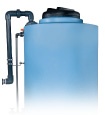The ASTM 1998 Gel Test: What Do The Numbers Mean?
The American Society for Testing and Materials (ASTM) has four tests in place for cross-linked polyethylene tanks. All are intended to ensure that the tank’s materials and composition meet the safety standards necessary for operational chemical storage tanks.
One of those tests, the ASTM Gel Test, is an accurate indication of the amount of cross-linked resin in a polyethylene tank. Having a storage tank that can’t pass the ASTM gel test means having a storage system prepared to fail, so let’s take a closer look at the gel test and how to understand its results.
About The ASTM Gel Test
The ASTM 1998 gel test is performed after a tank is molded; we cut a small sample out of the innermost 1/8” of the tank wall. We use a piece of the interior tank wall because that part of the tank interacts with the chemical, and is what needs to be structurally able to withstand the effects of chemical interaction. The piece of the tank goes through the following process:
- The sample is weighed, as is.
- It is placed into a 100 mesh SS screen container and weighed again.
- Then, It is placed in a solution of Cyanox2246 and xylene.
- The sample is then boiled for 16 hours in this solution.
- We remove the sample and dry it for 2 hours, and then weigh it again.
What is left is the weight of the cross-linked resin material only.
What Do The Numbers Mean?
By doing a simple percentage calculation of the remaining weight of the tank sample, we are able to get a reading on the tank’s structural integrity. The ASTM Gel Test, requires that the percentage of cross-linked resin in a polyethylene tank must be 60% or greater at the innermost 1/8” of the tank wall. Anything less is unacceptable and would result in a structurally unsound tank.
It is important to uphold ASTM standards so that the material of a polyethylene chemical storage tank system is strong and ready to effectively store the chemical it is designed for.
For more information on how we conduct the ASTM-D 1998 Gel Test, contact a chemical storage expert.
- April 2, 2015
- Topics: Certifications and Standards
About Poly Processing
Posts By Topic
Tech Talk Podcast Episodes
Subscribe By Email
Recent Posts
- Protect Your Facility and Your Bottom Line with a Chemical Leak Detection System
- PPC Installation, Operation, and Maintenance Manual: Ensure Tank Longevity
- How To Use The Chemical Resistance Guide
- Better and Safer Alternatives to Downpipes
- Crosslinked Polyethylene Vs. Fiberglass Reinforced Plastic Tanks
Tank Configurator

Find the recommended tank and system components for your chemical storage challenge.
Configure a Tank Package


